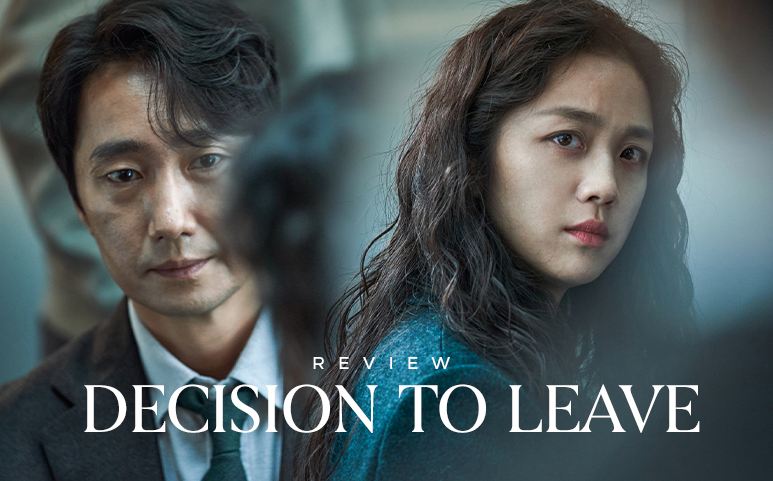You’re a cop, on a rooftop, facing a guy with a knife. You have no weapon, so what to do? You reach into your pocket and pluck out a glove, made of fine chain mail, as was once used to cowl the heads and necks of medieval knights. Pulling on the glove, you grab—without fear of injury—the blade that your enemy thrusts at you, make a fist of your free hand, and punch his lights out. A nice move, and just one of the practical lessons to be drawn from “Decision to Leave,” the latest film from Park Chan-wook. Other tips: when interviewing a suspect at a police station, order in two boxes of premium sushi to feed the friendly mood. Also, as one of the characters says, “Killing is like smoking. Only the first time is hard.” Sensible advice, though I need to know how easy it is to quit killing. Do you wear a patch? Or chew anti-homicidal gum?
The begloved cop is Hae-joon (Park Hae-il), who, during the week, lives in the Korean city of Busan. On weekends, he goes home to his wife, Yoo Mi-ji (Jung Yi-seo), who works at a nuclear power plant in another town. Hae-joon is bright, polite, punctilious, fit (outpacing his young deputy during a chase on foot), skilled at cooking, and, you might think, difficult to fool. If only he could sleep. One day, Hae-joon is called to inspect a dead body, at the foot of a towering rock, and we are treated to a demonstration of the visual wit—frequently grand, yet etched with a cunning forensic precision—in which Park and his director of photography, Kim Ji-yong, like to deal. From a distance, we spot two tiny figures being hauled to the top of the rock, on an electric pulley; in closeup, we see the cracked face of a Rolex, its hands now motionless, and ants slaving over an eyeball. Something about this case is starting to crawl.
The widow of the fallen man, who was an experienced climber, is Seo-rae (Tang Wei), and she is far from prostrate with grief. “I worry when he does not come back from a mountain, thinking he might die at last.” At last? Is she relieved ? To be fair, we shouldn’t read too much into her phrasing, because, as she says, “I’m Chinese, my Korean is insufficient.” Like Park’s previous film, “The Handmaiden” (2016), “Decision to Leave” is rich in linguistic slippage. At one point, on a snowy night, Seo-rae speaks Chinese into her phone, which, in turn, thanks to the dangerous miracle of Google Translate, talks in Korean to Hae-joon. He is standing in front of her, adrift in the blizzard of words.
Gadgetry is everywhere in the new film (how lonely Hae-joon looks, dictating his thoughts into the phone on his wrist), yet it’s only one cog in the ticking machinery of Park’s plot. The whole thing is engineered, we realize, to tell a tale of obsessive love. Thus, as Hae-joon, sitting in his car with binoculars, observes Seo-rae at work—she is a caregiver, who believes that “living old people come before dead husbands”—he magically appears in the room beside her, like Kirk beaming up next to Mr. Spock. The imagery answers to Hae-joon’s desire, granting him a proximity to Seo-rae that life, even the life of a prying detective, cannot supply. All the while, of course, he is supposed to be establishing whether or not she pushed her husband off that rock. The quest grows more urgent in the movie’s second half, as Hae-joon, “completely shattered,” gives up the job in Busan and goes home. You really think the case is closed? Open wide.
One way to size up this singular film is to enumerate all that it lacks. Of the nastiness that spattered Park’s early works there is no sign; any violence here is brisk and fleeting. As for the glistening carnality of “The Handmaiden,” forget it; Hae-joon does have sex with his wife, on the red-hot principle that, as she says, “new research suggests it’s good for cognitive ability,” but his rapport with Seo-rae is hilariously chaste. See her fumble through his raincoat and find a tube of lip gloss! Wait two hours for a kiss! Fans of Tang Wei, who recall what she brought to the erotic candor of Ang Lee’s “Lust, Caution” (2007), will note the demureness with which, as Seo-rae, she raises her skirt to display a mark on her thigh. Compare Lauren Bacall, in “The Big Sleep” (1946), scratching the itch on her knee.
Despite such restraint, or because of it, “Decision to Leave” bears the persuasive potency of true romance. It should be called “Love, Recklessness.” Having been twisted into bewildered bits by the convolutions of Park’s narrative, I was astonished, toward the end, to find it brushing against the tragic. The entire movie has swarmed, often farcically, with aquatic details; poor Hae-joon even had his finger bitten by a turtle. Now, however, he staggers alone along a beach. The sun, on the horizon, is ready to call it a day. Amid the crash of breakers, you can just about hear him crying out for Seo-rae. Whether she turns up, and what waves of crime have or have not swept her to this shore, I leave you to discover.
In another life, the director of “Silver Linings Playbook” (2012), David O. Russell, would have made disaster flicks in the nineteen-seventies. The purpose of that noble genre was to stuff as many stars as possible, exquisitely mismatched, into a confined space; on board the deadly-virus-bearing train in “The Cassandra Crossing” (1976), for example, were Sophia Loren, Burt Lancaster, Ava Gardner, Richard Harris, and Martin Sheen, plus an unusual pairing of Ingrid Thulin, so often the purveyor of agony for Ingmar Bergman, and O. J. Simpson. Too much? Not by the standard of “Amsterdam,” Russell’s new film, which features Christian Bale, Margot Robbie, John David Washington, Zoe Saldaña, Chris Rock, Mike Myers, Michael Shannon, Anya Taylor-Joy, Rami Malek, Robert De Niro, and—hold the phone—Taylor Swift. If ever a cast cried out for a bug on a train, or a skyscraper on fire, it’s this one.
Bale plays Burt Berendsen, who is badly hurt in the First World War, as is his pal, Harold Woodman (Washington). In Belgium, their wounds are tended by a nurse named Valerie (Robbie); her surname shifts as we go along, and is best kept under wraps. Initially in hospital and then, once the conflict is over, in the gilded leisure of Amsterdam, the three of them form an unbreakable pact of friendship. Before long, needless to say, it is broken. Burt, sporting a glass eye, returns to New York, to the icy disdain of his wife, Beatrice (Andrea Riseborough), and to his career as a doctor, much of it spent relieving the pain of other ex-combatants. Harold, too, finds himself in the city, practicing as an attorney. But where, pray, did Valerie go? And what will connoisseurs of early-twentieth-century romantic threesomes learn from “Amsterdam” that they don’t already get from “Jules et Jim” (1962)?
Russell’s plot quickens, thickens, and stalls. Burt, at the autopsy of his old military commander, meets a fellow-medic, Irma (Saldaña), who views the death as suspicious. The trail leads to a mansion, home to the flighty but fearsome Libby Voze (Taylor-Joy) and her husband, Tom (Malek), who seems to be as pliably soft as his sweater. Appearances, though, are calculated to deceive, and Burt and Harold soon happen upon a hideous—yet unmistakably daft—conspiracy to inject Fascism into the American bloodstream. The fate of such an evil scheme depends on a speech, to be delivered to veterans by a retired general (De Niro). The latter stages of the film are chewed up, interminably, by the prelude to this major event.
“Amsterdam” is, or is meant to be, a caper: an easygoing endeavor, you might think. But capering is as tricky on the silver screen as it is on the dance floor, and the tone of the tale keeps losing its footing. To and fro we trip across the years. A couple of ornithologists-cum-spies (Shannon and Myers) pop up in postwar Europe, and again, in the mid-nineteen-thirties, in the U.S.A. The screams of bloody soldiers, on stretchers, are overlaid by a merry musical score. Burt describes his duties as “fixing faces, raising spirits, singing songs,” and the strain of that mingling tells on Bale, whose performance is unhappily redolent of late-period Al Pacino, complete with hiccupping speech patterns and loony stares. What we see in Bale is a tremendously serious actor proffering a considered essay in comedy—which is not, alas, the same as being a funny guy.
Only in its milder moments, when Russell is not trying too hard to be madcap, or to badger us with dark political portents, does “Amsterdam” stir and convince. An early conversation at the hospital, between Harold and Valerie, isn’t exactly a heart-to-heart, yet we do feel, by the end of it, that we have witnessed two people falling—calmly, not crazily—in love. She shows him scraps of art that she has made, from spent bullets; her later efforts include collages, photographs, wire sculptures, and X-rays, many of them created for the movie by the British artist Linder Sterling, and riffing beautifully, I’d say, on the work of Meret Oppenheim and Man Ray. In short, you should go to Russell’s film, but not for fun. Go for the art.
![]()
![]()


